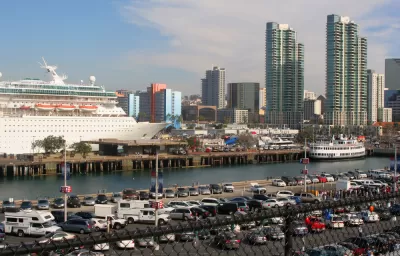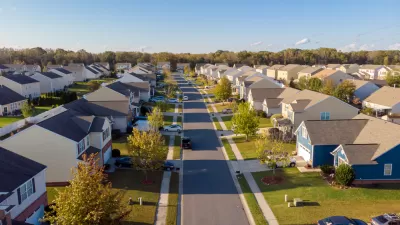Environmental causes run into conflict with zoning reforms intended for environmental benefit once again, as the California Coastal Commission requires San Diego to reinstate parking requirements for ADUs.

The California Coastal Commission (CCC), citing the public access requirements of the California Coastal Act, nixed zoning reforms approved by the city of San Diego making it possible to build accessory dwelling units without parking requirements.
A paywalled article by David Garrick for the San Diego Tribune reports the news, noting that the actions of the California Coastal Commission will apply only in the coastal areas o the city governed by the extra regulations of the California Coastal Act.
For non-paywalled news on the same story, an article by Frank Gormlie for OB Rag reports that the San Diego City Council has responded to the demands of the California Coastal Act by voting to rescind the parking reforms for accessory dwelling units in the coastal area.
Researchers have documented for years the lengths private property owners will go to restrict public access to the California coastline—a right guaranteed by the California Coastal Act approved in 1976—in addition to anecdotes reported in the news. The mandate to ensure access to coastal areas has for years focused on the inclusion of parking in coastal developments. The pressures between public access and private land ownership is mentioned in the CCC decision to block San Diego’s parking reforms.
It represents a potential substantial intensification of residential development in the coastal zone without a commensurate increase in off-street parking. An increase in parking demand could result in residents of the accessory uses, the primary residence, or both, occupying public parking that would otherwise be used by coastal visitors, increasing the burden of accessing the coast and deterring coastal recreation. -California Coastal Commission
A reasonable argument could be made, however, that exclusionary zoning regulations, such as onerous parking requirements, do more to restrict access to the California coast than any lack of parking. There is also, of course, the proven fact that parking induces Vehicle Miles Traveled (VMT) and increases greenhouse gas (GHG) emissions. Because transportation is the leading source of GHG emissions in the United States, parking requirements like those enforced in San Diego by the California Coastal Commission also present an existential risk to the coast of California, through sea-level rise, species extinction, and other negative externalities created by climate change.

Study: Maui’s Plan to Convert Vacation Rentals to Long-Term Housing Could Cause Nearly $1 Billion Economic Loss
The plan would reduce visitor accommodation by 25,% resulting in 1,900 jobs lost.

North Texas Transit Leaders Tout Benefits of TOD for Growing Region
At a summit focused on transit-oriented development, policymakers discussed how North Texas’ expanded light rail system can serve as a tool for economic growth.

Using Old Oil and Gas Wells for Green Energy Storage
Penn State researchers have found that repurposing abandoned oil and gas wells for geothermal-assisted compressed-air energy storage can boost efficiency, reduce environmental risks, and support clean energy and job transitions.

Private Donations Propel Early Restoration of Palisades Playground
Los Angeles has secured over $1.3 million in private funding to restore the Pacific Palisades playground months ahead of schedule, creating a modern, accessible space that supports community healing after recent wildfires.

From Blight to Benefit: Early Results From California’s Equitable Cleanup Program
The Equitable Community Revitalization Grant (ECRG) program is reshaping brownfield redevelopment by prioritizing projects in low-income and environmental justice communities, emphasizing equity, transparency, and community benefits.

Planting Relief: Tackling Las Vegas Heat One Tree at a Time
Nevada Plants, a Las Vegas-based nonprofit, is combating the city’s extreme urban heat by giving away trees to residents in underserved neighborhoods, promoting shade, sustainability, and community health.
Urban Design for Planners 1: Software Tools
This six-course series explores essential urban design concepts using open source software and equips planners with the tools they need to participate fully in the urban design process.
Planning for Universal Design
Learn the tools for implementing Universal Design in planning regulations.
Ascent Environmental
Borough of Carlisle
Institute for Housing and Urban Development Studies (IHS)
City of Grandview
Harvard GSD Executive Education
Toledo-Lucas County Plan Commissions
Salt Lake City
NYU Wagner Graduate School of Public Service





























